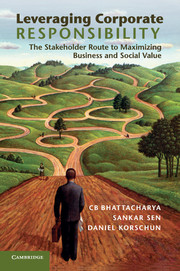Book contents
- Frontmatter
- Contents
- Figures
- Tables
- Exhibits
- Acknowledgements
- One The long and winding road to CR value
- Part I Deconstructing CR value
- Part II Inside the mind of the stakeholder
- Four What stakeholders see and hear
- Five The psychological engine that drives CR reactions
- Six How context influences the process
- Part III Putting insight into action
- Appendix Our research program
- Index
- References
Six - How context influences the process
from Part II - Inside the mind of the stakeholder
Published online by Cambridge University Press: 05 June 2012
- Frontmatter
- Contents
- Figures
- Tables
- Exhibits
- Acknowledgements
- One The long and winding road to CR value
- Part I Deconstructing CR value
- Part II Inside the mind of the stakeholder
- Four What stakeholders see and hear
- Five The psychological engine that drives CR reactions
- Six How context influences the process
- Part III Putting insight into action
- Appendix Our research program
- Index
- References
Summary
In the previous chapters, we laid out how stakeholders see CR, how they interpret CR information, and how they respond to CR. This straightforward multi-step process will – all things being equal – predict stakeholder behavior and help build the business case for engaging in CR activity.
But all things are rarely equal. That's why CR's ability to create value depends greatly on the context in which it is implemented. Knowing how context influences outcomes is critical to effective CR management, because only managers who build this knowledge into their decision-making can take full advantage of the opportunities, while also steering clear of the potential pitfalls.
The significance of context
This chapter presents some of the most important contributing contextual factors in stakeholder responses to CR. We call these multipliers. Multipliers magnify or dampen the effects of one part of our framework – and therefore its influence – on another part.
- Type
- Chapter
- Information
- Leveraging Corporate ResponsibilityThe Stakeholder Route to Maximizing Business and Social Value, pp. 119 - 150Publisher: Cambridge University PressPrint publication year: 2011

